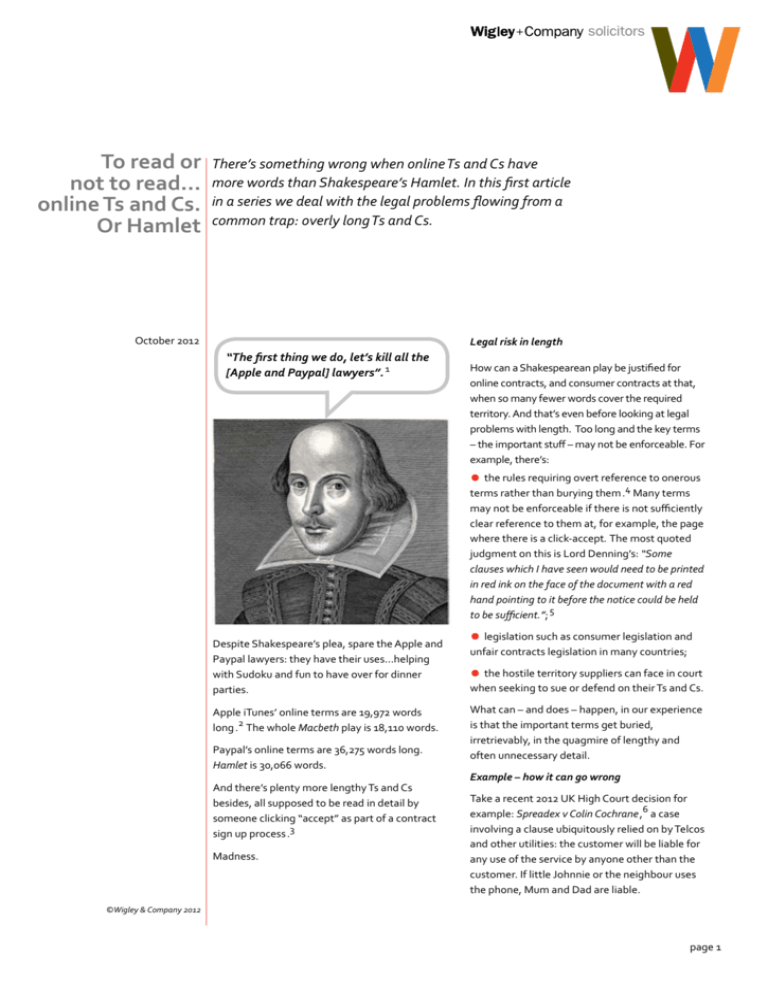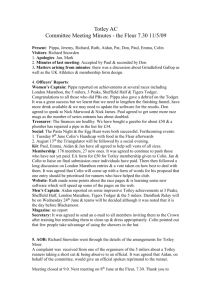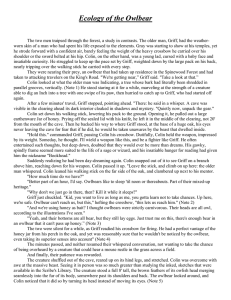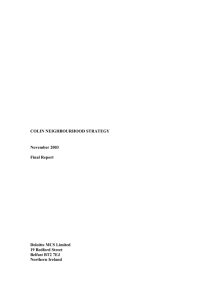To read or not to read... online Ts and Cs. Or Hamlet
advertisement

To read or not to read... online Ts and Cs. Or Hamlet There’s something wrong when online Ts and Cs have more words than Shakespeare’s Hamlet. In this first article in a series we deal with the legal problems flowing from a common trap: overly long Ts and Cs. October 2012 Legal risk in length “The first thing we do, let’s kill all the [Apple and Paypal] lawyers”. 1 How can a Shakespearean play be justified for online contracts, and consumer contracts at that, when so many fewer words cover the required territory. And that’s even before looking at legal problems with length. Too long and the key terms – the important stuff – may not be enforceable. For example, there’s: to onerous • the rules requiring overt reference 4 terms rather than burying them. Many terms may not be enforceable if there is not sufficiently clear reference to them at, for example, the page where there is a click-accept. The most quoted judgment on this is Lord Denning’s: “Some clauses which I have seen would need to be printed in red ink on the face of the document with a red hand pointing to it before the notice could be held to be sufficient.”; 5 Despite Shakespeare’s plea, spare the Apple and Paypal lawyers: they have their uses...helping with Sudoku and fun to have over for dinner parties. Apple iTunes’ online terms are 19,972 words long .2 The whole Macbeth play is 18,110 words. Paypal’s online terms are 36,275 words long. Hamlet is 30,066 words. And there’s plenty more lengthy Ts and Cs besides, all supposed to be read in detail by someone clicking “accept” as part of a contract sign up process .3 Madness. • legislation such as consumer legislation and unfair contracts legislation in many countries; • the hostile territory suppliers can face in court when seeking to sue or defend on their Ts and Cs. What can – and does – happen, in our experience is that the important terms get buried, irretrievably, in the quagmire of lengthy and often unnecessary detail. Example – how it can go wrong Take a recent 2012 UK High Court decision for example: Spreadex v Colin Cochrane,6 a case involving a clause ubiquitously relied on by Telcos and other utilities: the customer will be liable for any use of the service by anyone other than the customer. If little Johnnie or the neighbour uses the phone, Mum and Dad are liable. ©Wigley & Company 2012 page 1 To read or not to read... online Ts and Cs. Or Hamlet Spreadex is an online betting service, allowing punters to bet against movement of share and commodity prices. Colin Cochrane signed up and click-accepted that he had “read and understood” the Customer Agreement. All 49 closely typed pages. Colin did well on his betting and was ahead of the game. But, while away from home, Colin’s girlfriend’s young son had a field day on the site, unknown to his Mum and Colin. Colin lost plenty via, said Colin, his girlfriend’s son. Spreadex unsuccessfully sued for the shortfall .7 First the judge said that the 49 pages did not create an agreement with valid consideration. It’s a little hard to follow that point, and it might be wrong, but why risk having terms that are not enforceable when that is easily solved from a contract perspective with clear words in about a line or two of drafting, confirming consideration and agreement. The 49 pages counted for nothing without that line or two. And then, applying UK unfair contract terms legislation, for which the law elsewhere such as the onerous terms principles may substitute, the Judge said that, in all the circumstances, including burying the term in 49 pages, the term making Colin liable for use by others was not enforceable. This sort of term is important for Telcos, utilities, and more besides. There are ways of making them work legally, if done well. But suppliers need to choose which terms are important, and why, and then carefully target making them enforceable. A close review usually reveals that what is truly important is not what appears to be important on a quick review, but something else. Wigley+Company PO Box 10842 Level7/107 Customhouse Quay, Wellington T +64(4) 472 3023 E info@wigleylaw.com and in Auckland T +64(9) 307 5957 www.wigleylaw.com Why do Ts and Cs get to be too long? Why do lawyers end up writing the length of Hamlet and Macbeth, with fascinating prose better than Shakespeare, of course. It’s not that they are paid by the word “o’er lawyers’ fingers, who straight dream on fees” .8 No, busy lawyers often just incrementally build on existing terms, rather than ensuring cohesive and more effective terms. So, length builds on length. Maybe that’s OK if they work legally: why polish up Ts and Cs that no one is going to read anyway? But unfortunately they may not work when they need to work, and stuff can get missed out. 1. Henry VI Part Two, Dick the Butcher to Jack Cade 2. Including the privacy policy and other Ts and Cs 3. As UK Consumer watchdog, Which, has reported. 4. See the cases in many jurisdictions citing the so called Interfoto rule, derived from the UK Court of Appeal case of that name). 5. Lord Denning’s famous quote – well for law students anyway - from Spurling v Bradshaw. Application of the Interfoto rules are context specific, and depend, for example, on whether the customer hand signed the document, or not. 6. [2012] EWHC 1290 (Comm) 7. At summary judgment level but the decision indicates challenges in pursuing the case beyond to trial. 8. Mercutio in Romeo and Juliet We welcome your feedback on this article and any enquiries in relation to its contents. This article is intended to provide a summary of the material covered and does not constitute legal advice. We can provide specialist legal advice on the full range of matters contained in this article. page 2











